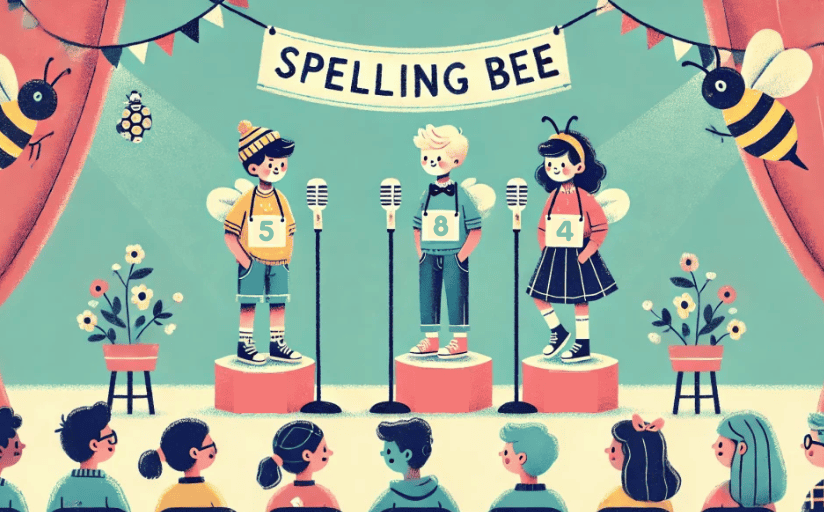We tend to think of grammar as the foundation of language, but where does spelling fit into the picture? Is spelling part of grammar, or does it operate independently?
(If you make a purchase using the links in this post, we may earn a commission.)
Is Spelling Part of Grammar or Reading?
Although spelling and grammar are closely related, they are entirely different categories of reading and writing. In essence, grammar is the rulebook governing the order of words, and spelling covers the order of letters.

What Is the Best Definition of Grammar?
According to the Chicago Manual of Style, “In its usual sense, grammar is the set of rules governing how words are put together in sentences to communicate ideas — or the study of these rules.”
Grammar is mainly concerned with the eight parts of speech:
- Adjective
- Adverb
- Conjunction
- Interjection
- Noun
- Preposition
- Pronoun
- Verb
But grammar also encompasses syntax, which means using words and phrases in the correct order to form well-structured sentences. Grammar also governs how to modify word forms and usages as they change tenses or become plural.
Grammar books or style guides will include guidance on the following topics:
- Proper and complete sentence structures
- Correct and consistent verb tenses
- Adjective and adverb placements
- Parallel list and comparison structures
- Capitalization guidelines
- Preposition usages
If you’re looking to deepen your understanding of grammar, the following resources can be incredibly helpful:
👉 BUY – The Elements of Style
👉 BUY – Grammar Girl’s Quick and Dirty Tips for Better Writing
👉 BUY – The Only Grammar Book You’ll Ever Need
Grammar changes very little over time and requires critical thinking to apply the rules correctly, so once you learn the fundamentals, you can build confidence in your writing skills.
What Does Spelling Mean?
Merriam-Webster says that spelling is “the forming of words from letters according to accepted usage.” Simply put, this means using the correct sequence of letters in a word.
Some key differences highlight how spelling differs from grammar as a writing component. While grammar tends to be more static, the spelling of words often changes slowly over time. (Take the word e-mail, which is now more commonly spelled email.)
Plus, while forming a sentence requires a unique interpretation of grammar rules, spelling correctly mostly involves memorization and practice, which is why children study sight words.
The dictionary is the definitive source for accurate spelling, but it’s important to note that publications like the Oxford Dictionary may spell certain words differently than Webster’s. However, it is routine for most dictionaries to publish alternate spellings in word entries.
Basic spelling rules include the following, briefly:
- I comes before e except after c (e.g., believe, receive).
- Never double the consonants j, k, v, w, or x.
- Pluralize words ending in a consonant and y by changing the y to i and adding -es (e.g., candy becomes candies).
- The letter q is usually paired with the letter u (e.g., queen, quick).
- The root word typically does not change when adding a prefix (e.g., happy becomes unhappy).
- Drop the final -e when adding a suffix that starts with a vowel (e.g., make becomes making).
- Double the final consonant when adding a suffix to a one-syllable word ending in consonant-vowel-consonant (e.g., run becomes running).
- Change final -f to -ves to make some plurals (e.g., wolf becomes wolves).
- Words ending in -y preceded by a vowel keep the y when pluralized (e.g., key becomes keys).
- Words ending in -c get a -k before suffixes starting with -e, -i, or -y (e.g., panic becomes panicked).
These are common spelling guidelines, but this list is not without exceptions. Some words break these basic spelling rules mainly due to their origins in other languages and historical spellings.
Learning how to spell also includes knowing the different ways to spell the same sound, which letters are usually silent, and which letters have more than one sound.
For example, the long “a” sound can be spelled in multiple ways, such as in eight, play, and say. Again, this is where knowing sight words can be more helpful than learning all the different spelling rules and their exceptions.

Can Spelling Ever Be a Part of Grammar?
Spelling plays a role in grammar by making sure that words are formed correctly, but as a whole, spelling is its own category of reading and writing.
Do you have questions beyond whether spelling is a part of grammar? Go check out our additional grammar tips, or ask your question in the comments below.
- Is Spelling Considered Part of Grammar? – December 2, 2024
- Commonly Confused Words: Biannual vs. Semiannual vs. Biennial – November 30, 2024
- How To Format a Short Story – November 28, 2024

Leave a Reply